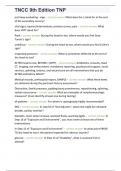TNCC 9th Edition TNP
just keep evaluating - vipp - correct answer What does the J stand for at the end
of the secondary survery?
vital signs, injuries/interventions, primary survey, pain - correct answer What
does VIPP stand for?
flank - correct answer During the head-to-toe, where would you find Grey-
Turner's sign?
umbilicus - correct answer During the head-to-toe, where would you find Cullen's
sign?
inspecting posterior - correct answer What is sometimes deferred at the end of
the head-to-toe?
AFTER head-to-toe, BEFORE J (VIPP) - correct answer Antibiotics, consults, head
CT, imaging, law enforcement, mandatory reporting, psychosocial support, social
services, splinting, tetanus, and wound care are all interventions that you do
AFTER and before WHAT?
Medical records, prehospital report, SAMPLE - correct answer What three items
are obtained during the pertinent history assessment?
Distraction, family presence, padding bony prominences, repositioning, splinting,
verbal reassurance - correct answer What are examples of nonpharmacologic
measures? (must identify at least one during testing)
all patients - correct answer For whom is capnography highly recommended?
EKG - correct answer In step M of "Get Adjuncts", what else might be indicated
besides cardiac monitor?
blankets, room temp increase, warmed fluids, warming lights - correct answer In
Step 16 of "Exposure and Environment", you must name at least one of these
interventions:
In Step 15 of "Exposure and Environment" - correct answer At what point PRIOR
TO the head-to-toe is the patient inspected for obvious injuries?
glucose - correct answer In Step 13 of "Disability", what is assessed if pt is
altered?
,TNCC 9th Edition TNP
1. inspect AND palpate skin color, temp, moisture and 2. palpate a pulse - correct
answer To assess circulation, you must do these two main tasks:
intervene as appropriate and reassess - correct answer What do you do when
alterations are identified in any of the steps in the primary survery?
1. attach CO2 detector and assess for evidence of exhaled CO2; 2. observe for rise
and fall of the chest w/ assisted ventilations; 3. auscultate over epigastrium for
gurgling AND lungs for bilateral breath sounds - correct answer What three
assessments must be done if the patient is intubated?
Breath sounds, depth/pattern/rate, spontaneous breathing, subcutaneous
emphysema, increased work of breathing, symmetrical chest rise and fall, tracheal
deviation/JVD, open wounds/deformities, skin color - correct answer Four of
these must be identified to assess breathing effectiveness:
cardiac monitor - correct answer What can be applied in step 12 of "Circulation
and Control of Hemorrhage" for which credit is given in the LMNOP section?
During "Circulation" assessment - correct answer When should 2 IV sites be
established?
assess ETT position by noting the number at teeth/gums AND secure ETT - correct
answer If the patient is intubated and you've already assessed ETT placement,
what else needs to be done with the ETT? (step 10)
moving patient from assisted ventilation to mechanical - correct answer What
should you verbalize after completing all ETT assessments?
"Breathing and Ventilation" - correct answer During which part of the primary
survey would you anticipate the need for a chest tube, intubation, decompression
of pneumothorax, oxygen, or BVMs?
bony deformity, loose teeth, edema, inhalation injury, sounds, tongue
obstruction, burns, fluids, foreign objects, vocalization - correct answer Four of
these must be identified to assess patency and protection of the airway:
Assessing patency and protection of the airway, Step 7 of
"Alertness and Airway with Simultaneous Cervical Spinal Stabilization" - correct
answer During which part of the primary survey would there be anticipation for
, TNCC 9th Edition TNP
intubation, insertion of OPA/NPA, removal of any loose teeth or foreign objects,
or suctioning?
the need for a second person to provide manual c-spine stabilization - correct
answer If c-spine stabilization is necessary, what need should be stated?
A.Decrease the rate of manual ventilation. - correct answer An adult patient who
sustained a severe head trauma has been intubated and is being manually
ventilated via a bag-mask device at a rate of 18 breaths/minute. The patient has
received one intravenous fluid bolus of 500 mL of warmed isotonic crystalloid
solution. The PaCO2 is 30 mm Hg (4.0 kPa), and the pulse oximetry is 92%. BP is
142/70 mm Hg. What is the most important intervention to manage the cerebral
blood flow?
A.Decrease the rate of manual ventilation.
B.Initiate another fluid bolus.
C.Recheck endotracheal tube placement.
D.Increase the amount of oxygen delivered.
post-concussive syndrome - correct answer An older adult presents to the
emergency department with complaints of dizziness, headache, and nausea. The
patient was involved in a motor vehicle collision 10 days ago. There was no loss of
consciousness and a hematoma is noted to the forehead. The patient is currently
on anticoagulant therapy. What is most likely the cause of their symptoms?
A.Intracerebral hemorrhage
B.Epidural hematoma
C.Diffuse axonal injury
D.Post-concussive syndrome
C.Elevating the leg to the level of the heart - correct answer A patient with a
lower extremity fracture complains of severe pain and tightness in his calf,
minimally relieved by pain medications. Which of the following is the priority
nursing intervention?




